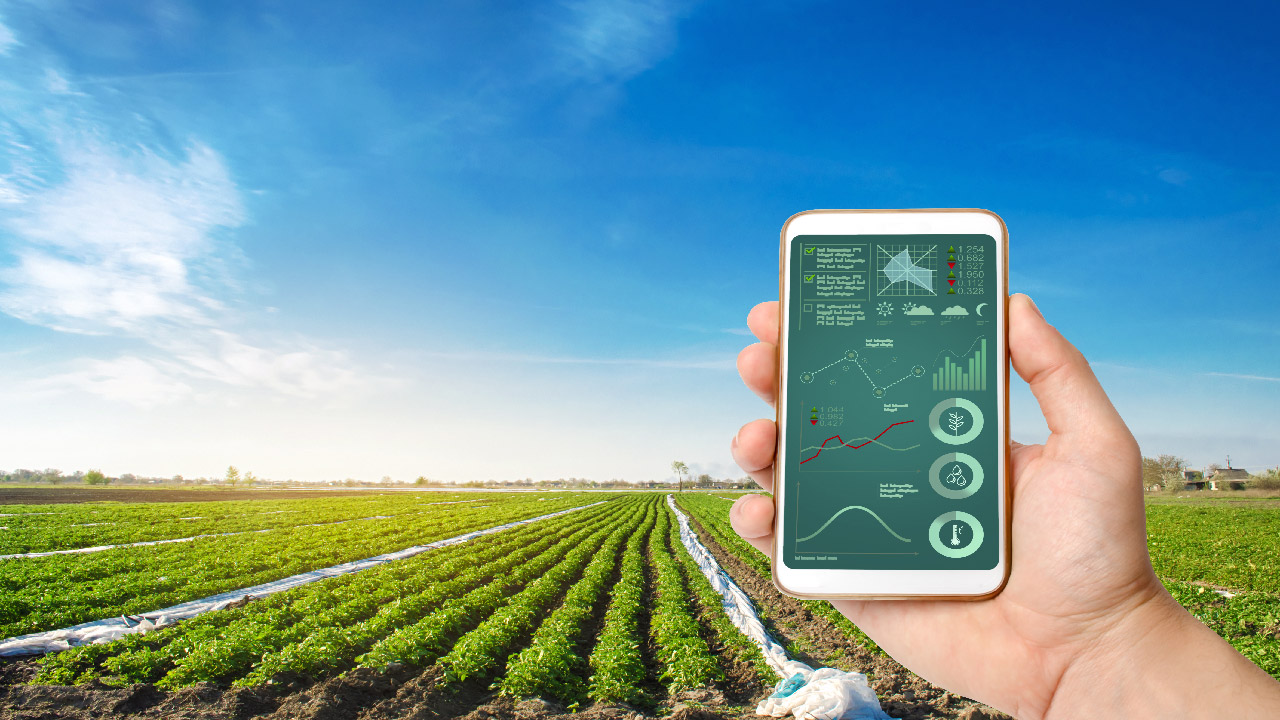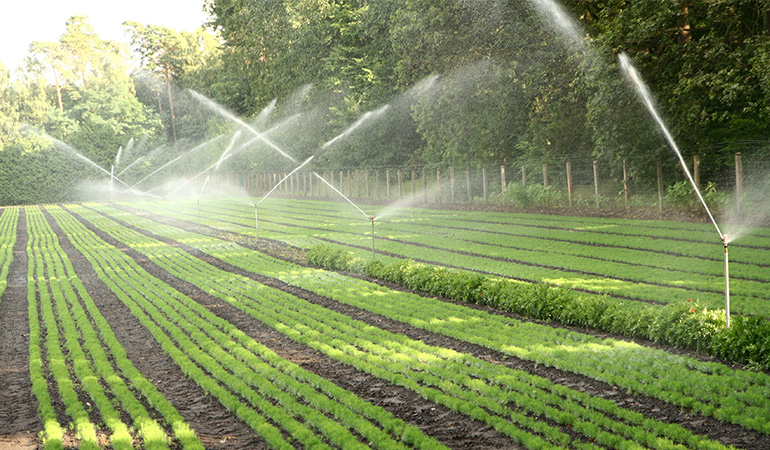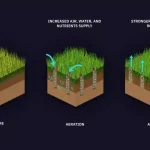Imagine a world where your garden or farm thrives with minimal effort from you. Picture lush fields and vibrant gardens, all managed with precision and care, without you having to lift a finger.
This isn’t a distant dream or a sci-fi movie plot. It’s the exciting reality brought to you by the future of irrigation: automation and AI. You’re about to discover how these technologies are transforming the way we water our crops and gardens.
They’ll save you time, reduce costs, and conserve precious water resources. By the end of this article, you’ll understand how embracing these innovations can revolutionize your approach to irrigation, ensuring you stay ahead in the game. Ready to see how the future of irrigation can change your world? Let’s dive in.

Smart Irrigation Systems
Smart irrigation systems integrate automation and AI to optimize water usage in agriculture. Efficient technology adjusts water flow based on weather data and soil moisture. This innovation promises sustainable farming with less environmental impact.
Smart irrigation systems are transforming how we manage water for agriculture and landscaping. With the integration of automation and AI, these systems offer precise control and efficiency, promising a future where water conservation meets optimal crop yield. Imagine a world where your garden or farm receives just the right amount of water at the perfect time without you lifting a finger. That’s the power of smart irrigation. ###How Smart Irrigation Systems Work
At the heart of smart irrigation systems is the intelligent use of data. Sensors placed in the soil and weather data analysis ensure that water is used effectively. These systems make real-time adjustments to water distribution based on current conditions. The technology goes beyond simple timers. Traditional systems water plants on a fixed schedule, often wasting water. Smart systems respond to changes in weather, soil moisture, and even plant health. This adaptability reduces water waste significantly. ###Benefits Of Smart Irrigation
One major advantage is water conservation. These systems are designed to minimize water use by delivering the exact amount needed. This is crucial in areas facing water scarcity. Another benefit is cost savings. By reducing water usage, you also cut down on utility bills. Over time, the savings from efficient water management can be substantial. Moreover, smart irrigation can lead to healthier plants. By providing water only when needed, plants can thrive without the stress of over or under-watering. This can result in higher crop yields and more beautiful landscapes. ###Challenges And Considerations
Implementing smart irrigation systems isn’t without its challenges. One major consideration is the upfront cost. Advanced technology often comes with a higher price tag, which can be a barrier for some users. There’s also the need for technical knowledge. Setting up and managing these systems requires some understanding of the technology. However, many companies offer user-friendly interfaces and support to ease the transition. Another challenge is data privacy. With AI systems collecting data, users must be aware of how their information is used and stored. ###Your Role In The Future Of Irrigation
As a user, you play a crucial role in the future of irrigation. By adopting smart systems, you contribute to water conservation efforts. But it’s not just about saving water; it’s about creating a sustainable environment for future generations. Have you ever thought about how much water you could save with smarter irrigation? Perhaps now is the time to consider investing in these systems. They not only benefit you but also the planet. Imagine the impact if every household and farm used smart irrigation. The potential for water savings and environmental benefits is enormous. Will you be part of this change?Role Of Ai In Water Management
Artificial Intelligence is transforming water management in agriculture. It offers smart solutions for efficient water use. Farmers can save resources and improve crop yields. AI technology helps in precise water delivery. It also predicts weather changes. This ensures plants get the right amount of water.
Smart Sensors And Data Analysis
AI uses smart sensors to collect data. These sensors monitor soil moisture levels. They also track weather conditions. AI analyzes this data quickly. It suggests when and how much to water crops. This reduces water wastage. It also helps in maintaining soil health.
Predictive Weather Forecasting
AI can predict weather patterns. It uses past data and current conditions. Farmers get alerts for rain or drought. This helps them plan irrigation better. AI ensures crops receive water only when needed. This prevents over-irrigation and saves water.
Automated Irrigation Systems
AI powers automated irrigation systems. These systems work without human intervention. They adjust watering schedules automatically. This is based on real-time data. Farmers can focus on other tasks. They trust AI to handle irrigation efficiently.
Resource Optimization
AI helps in optimizing water resources. It identifies areas needing more or less water. This ensures uniform crop growth. Farmers save water and energy. AI helps in reducing costs and increasing profits. It makes farming sustainable.
Advancements In Sensor Technology
Advancements in sensor technology are transforming irrigation by enabling smarter water management. These innovations use automation and AI to optimize water use, ensuring efficient crop growth. As a result, farmers can better monitor soil moisture and weather conditions, reducing water waste and enhancing agricultural productivity.
Advancements in sensor technology are reshaping the future of irrigation, offering precise, efficient, and intelligent solutions. These sensors are becoming the backbone of automated irrigation systems, ensuring that water is used wisely and plants are nurtured optimally. If you’re wondering how these sensors work and what makes them so transformative, let’s dive into the details.Understanding Soil Moisture Sensors
Soil moisture sensors are game-changers in irrigation. They measure the water content in the soil, providing real-time data to irrigation systems. This means your plants get exactly the water they need, reducing waste and enhancing growth. Imagine your garden knowing when it needs water before you do. That’s the power of soil moisture sensors. They take the guesswork out of watering, allowing you to save both time and resources.The Role Of Weather Sensors
Weather sensors are becoming essential for modern irrigation. They monitor local weather conditions like rainfall, temperature, and humidity. This information helps irrigation systems adjust water usage according to the current weather. Have you ever watered your garden just before a rainstorm? Weather sensors prevent such mishaps. They help create a responsive system that adapts to environmental changes, ensuring your plants get the right amount of water at the right time.Integration Of Nutrient Sensors
Nutrient sensors are pushing irrigation technology further. They measure the nutrient levels in the soil, providing crucial data for plant health. This allows for precise fertilization, reducing the risk of over or underfeeding your plants. Think about how nutrient sensors can transform your gardening. You can maintain optimal soil health without guessing the nutrient needs of your plants. This not only enhances plant growth but also promotes sustainable farming practices.Wireless Technology In Sensors
Wireless technology has revolutionized sensor deployment. Sensors can now communicate over vast distances without complex wiring. This simplifies installation and makes it easier to monitor multiple fields or gardens from a single device. Have you ever been frustrated by tangled wires in your garden? Wireless sensors eliminate that hassle, offering a clean and efficient solution. You can now manage your irrigation system seamlessly, even from afar.Smart Integration With Ai Systems
AI systems are the brains behind modern irrigation, processing data from sensors to make intelligent decisions. They analyze patterns, predict weather, and optimize water usage. This integration ensures that your irrigation system is both proactive and efficient. Imagine an irrigation system that learns from past patterns to improve future watering schedules. AI makes this possible, turning your garden into a smart ecosystem. As these technologies advance, they open up new possibilities for sustainable and productive agriculture. Are you ready to embrace these advancements in sensor technology? The future of irrigation is here, and it’s more exciting than ever.
Challenges And Opportunities
Exploring automation and AI in irrigation presents both challenges and opportunities. Challenges include high costs and technical complexities. Opportunities arise from enhanced water efficiency and improved crop management, potentially transforming agricultural practices.
As the world of agriculture evolves, the integration of automation and AI in irrigation presents both challenges and opportunities. These technologies promise to transform how water is used in farming, but the path forward is not without obstacles. Understanding these can help you make informed decisions about implementing new systems in your fields.Challenges Of Implementing Automation And Ai
One major challenge is the initial cost. Installing automated irrigation systems and AI technology can require significant upfront investment. For small-scale farmers, this can be a barrier to entry. Technical expertise is another hurdle. Many farmers may not have the necessary skills to manage and maintain these advanced systems. This can lead to reliance on external experts, increasing operational costs. Data security and privacy concerns are growing. With AI systems collecting vast amounts of data, ensuring this information is protected from breaches is crucial.Opportunities For Improved Efficiency
Automation and AI can significantly boost irrigation efficiency. By using precise data, these systems can optimize water usage, reducing waste and conserving resources. This not only benefits the environment but also cuts down on water costs. Another opportunity is the ability to predict water needs accurately. AI can analyze weather patterns and soil conditions to determine the exact amount of water required, improving crop yields. These technologies offer scalability. As your farm grows, automated systems can easily expand, accommodating increased irrigation needs without a proportional rise in labor costs.Embracing Technological Advancements
Adopting new technology is not just about keeping up with trends; it’s about staying competitive. Those who embrace AI and automation early can gain a significant advantage. Consider attending workshops or training sessions to better understand these systems. This investment in knowledge can reduce dependency on outside experts. Think about the long-term benefits. While the initial costs may seem high, the potential savings on water and labor can outweigh these expenses over time. Are you ready to overcome these challenges and seize the opportunities? The future of irrigation is here, and it’s waiting for you to take the plunge.
Conclusion
The future of irrigation looks bright with automation and AI. Farmers gain better control over water use. This leads to healthier crops and saves money. AI predicts weather patterns, helping plan irrigation schedules. Automation reduces labor needs, freeing up time for other tasks.
Technology continues to advance, offering new tools for efficient farming. Embrace these changes to improve agricultural practices. Small farms and large ones alike benefit from these innovations. Stay informed and ready for what’s next in smart irrigation. The journey of modern farming just got more exciting.


